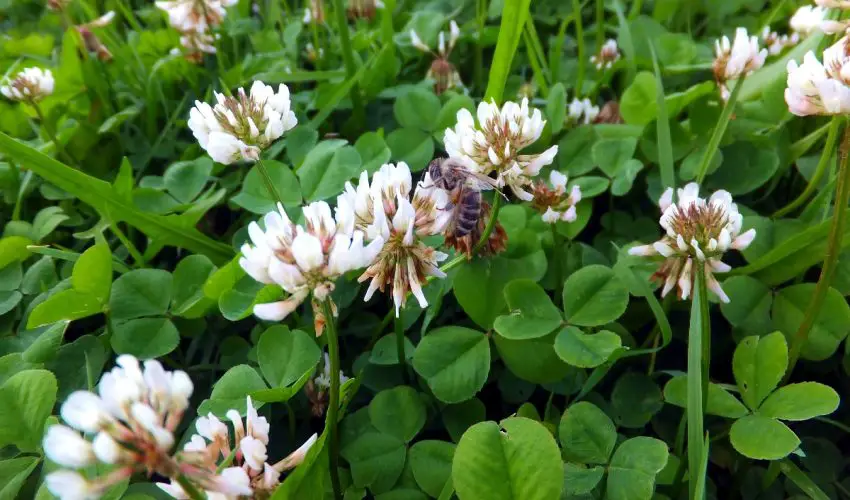Luckily, there are 100% natural and organic methods for ridding your lawn of clover. Best of all, no chemicals are used in this process. Let’s take a look at these holy grail methods.
1. Pulling Out the Clover By Hand
This method works very well for small patches. This can be a fast solution to the clover you find growing in your yard. The best way to accomplish this is by using a spade, then diligently tugging the clover out along with the roots. If you fail to remove the roots, the clover will simply grow back.
2. Strip the Clover of Sunlight and Oxygen
This is a natural method because no chemicals are needed to block sunlight and oxygen from the clover. You will kill the clover “naturally.” The clover plant will have no choice except to die due to the lack of sunlight and oxygen. The best way to begin this process is by covering the clover with a garbage bag, plastic sheeting or something similar. Make sure to tightly secure the corners with rocks. You want to ensure this cover does not fly up. This method will take approximately 2 to 3 weeks.
3. Spray Clover with a Solution of Vinegar & Water
This concoction is 100% non-toxic and an easy home remedy using ingredients found in almost every home. The ingredients are vinegar, water and dish soap. Use one cup of white vinegar along with one cup of water. Squeeze one drop of dish soap into the spray bottle as well.
Spraying clover with this mixture will effectively dry out the plant’s leaves. The added drop of dish soap will ensure the vinegar’s mixture sticks to the plant’s leaves and indeed dries it out all the way. Please note that you may need to spray the mixture on all the weeds in the area to kill the clover. It is also important to remember that vinegar damages grass, so spray carefully.
4. Make Sure to Fertilize Your Grass
This may be considered a preventive measure, however, fertilizing your lawn is a sure-fire method to giving your grass growing advantage. When grass is unfertilized, clover is able to thrive since it has the growing advantage. Once you use high-quality organic fertilizer during the spring and fall, your grass instantly has the upper hand.
Organic fertilizer releases nitrogen slowly and makes your lawn less susceptible to clover. In other words, the clover will have a very difficult time surviving with well-fertilized grass.
While there are options on the market that are cheaper such as fast-release fertilizer, these are not organic and not healthy to use. Organic fertilizers are the way to go for ensuring healthy lawns down the line. Remember, you want to care for the health of your lawn long-term. Some examples of high-quality organic fertilizers are guano, cow manure, bone meal, liquid kelp and earthworm casting
5. Mow High
When you cut your grass short (such as under 3 inches), clover loves it. On the contrary, your grass does not like this. Grass becomes stressed and compromised when cutting this short. If you allow your grass to grow taller, it will have an edge over the clover. The best way to do this is by using the high setting on the lawnmower. The cut height will be anywhere from 3.25 inches to 4 inches. This will easily allow the grass to out-compete the weeds. Using this method consistently ensures you won’t need to apply harsh chemicals that can damage your grass and soil.
6. Cornmeal Gluten
Cornmeal gluten naturally releases organic peptides into the soil. The release of these peptides will prevent the rapid growth of clover. This method is preventive due to the fact it won’t work on existing clover. However, it will stop new seeds from sprouting.
This method will not harm the nearby grass. Steer clear of this method if you have recently reseeded your lawn because it will affect seeds from sprouting. The best way to purchase corn meal gluten is from a garden store. It can also be ordered online.
7. Use an Organic Herbicide
The last choice is to use an herbicide, however, there are 100% organic ones on the market. These herbicides are free of chemicals. They are formulated to kill clover, but not the grass. When properly sprayed, the herbicide will weaken the clover over time and kill it. You will have to continue applying the herbicide just like the vinegar mixture until the weed dies out.
More Tips for Clover Control and Healthy Grass
Keep your grass watered. This will help it to not be stressed and remain healthy. You don’t want to kill your grass while using any of these methods. Rather, you want to do everything you can to keep the grass healthy and thriving. This is particularly important if you live in a dry climate or if the grass is exposed to heat and drought.
Make sure your soil is of the correct pH. An incorrect soil pH can be the reason why your lawn has clover sprouting up. The most ideal soil pH is between 6 and 7. When your lawn is overly acidic, grass will have an extremely difficult time growing. Clover loves an acidic pH and will thrive under such conditions. The best way to balance your soil’s pH is with a soil amendment such as lime.
A lack of nitrogen can cause clover to grow rapidly. Grass requires nitrogen to grow properly but clover can get nitrogen from the air. The best way to ensure your soil has the nitrogen it needs is by using organic fertilizer. As mentioned previously, fast-release fertilizer is not nearly as healthy for your lawn. It can be the cause of low nitrogen levels since they lower overall soil quality.





